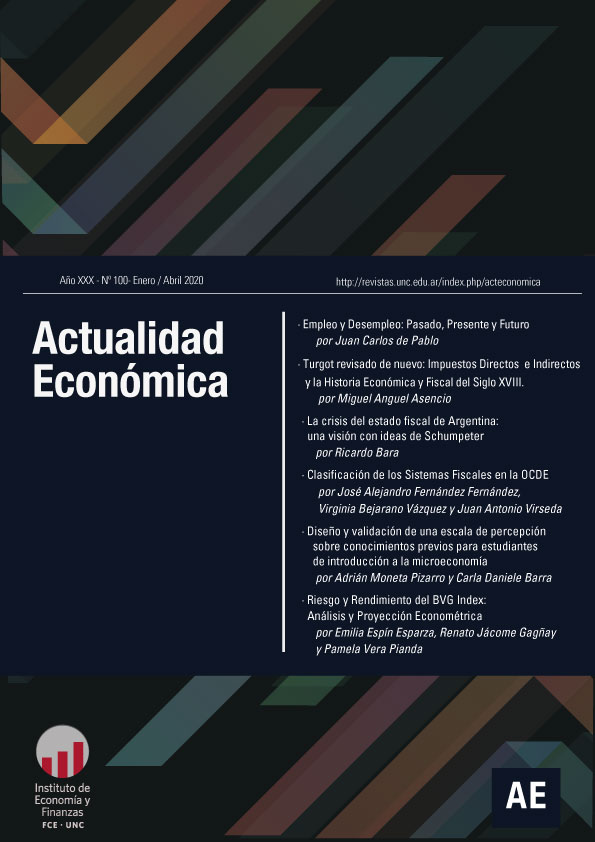Design and validation of a perception scale on previous knowledge for students of introduction to microeconomics
Keywords:
teaching of microeconomics, learning, previous knowledge, exploratory factorial analysisAbstract
A growing concern in universities is the low level of prior knowledge with which students access the first subjects of the degree courses. The area of economics in general and microeconomics in particular is no exception. In this paper we present a proposal for a questionnaire aimed at students of introduction to microeconomics, which allows them to explore the previous knowledge with which they arrive at the subject. The ad hoc instrument developed aims to highlight the level of prior knowledge according to the opinion of the students themselves in order to provide a complementary input for a more effective teaching of the subject and to provide a scale of measurement for research that seeks to relate prior knowledge to other variables of interest such as academic performance. We begin with a bibliographical review of the importance of considering students' previous knowledge, describe the phases of development of the instrument and present the results of an exploratory factorial analysis carried out on a sample of 326 students, which indicate that the questionnaire is valid for the proposed objectives.
Downloads
References
Ausubel, D. P., Novak, J. D., y Hanesian, H. (1983). Psicología educativa: un punto de vista cognoscitivo, Ed. Trillas, México.
Barahona, P. (2014). “Factores determinantes del rendimiento académico de los estudiantes de la Universidad de Atacama”. Estudios Pedagógicos, Vol. XL, Nº 1, 25-39.
Carretero, M. (2009). Constructivismo y educación, Ed. Paidós, Buenos Aires.
Coll, C. (1990). "Un marco de referencia psicológico para la educación escolar: la concepción constructivista del aprendizaje y de la enseñanza". En C. Coll, J. Palacios, A. Marches (eds.): Desarrollo psicológico y educación, II. Psicología de la Educación, Alianza Editorial, Madrid.
La Serna Studzinski, K., y Zhang, H. (2012). “La explicación del rendimiento en los cursos introductorios de economía. ¿Cuánto influye el profesor?: un estudio en la Universidad del Pacífico”. Documento de Discusión DD/12/07, Centro de Investigación de la Universidad del Pacífico.
Lloret-Segura, S., Ferreres-Traver, A., Hernández-Baeza, A., y Tomás-Marco, I. (2014). “El análisis factorial exploratorio de los ítems: una guía práctica, revisada y actualizada”. Anales de Psicología, Vol. 30, Nº 3, 1151-1169.
McArdle, J., Paskus, T., y Boker, S. (2013). “A Multilevel Multivariate Analysis of Academic Performances in College Based on NCAA Student-Athletes”. Multivariate Behavioral Research, 57-95.
Miras, M. (1999). "Un punto de partida para el aprendizaje de nuevos contenidos: los conocimientos previos." En: C. Coll, E. Marin, T. Mauri, M. Miras, J. Onrubia, I. Solé, A. Zabala (eds.). El constructivismo en el aula (pp. 47-63), Novena Edición, Graó, Barcelona.
Oviedo, H. C., y Campo-Arias, A. (2005). “Aproximación al uso del coeficiente alfa de Cronbach”. Revista Colombiana de Psiquiatría, Vol. 34, Nº 4, 572-580.
Peña, D. (2002). Análisis de datos multivariantes, McGraw-Hill Interamericana, Madrid.
Schermelleh-Engel, K., y Moosbrugger, H. (2003). “Evaluating the Fit of Structural Equation Models: Tests of Significance and Descriptive Goodness-of-Fit Measures”. Methods of Psychological Research Online, Vol. 8, Nº 2, 23-74.
Shin, Y., y Raudenbush, S. (2011). “The causal effect of class size on academic achievement multivariate instrumental variable estimators with data missing at random”. Journal of Educational and Behavioral Statistics, 154-185.
Downloads
Published
Issue
Section
License

This work is licensed under a Creative Commons Attribution-NonCommercial-NoDerivatives 4.0 International License.
Those authors who have published with this journal, accept the following terms:
Authors will conserve their copyright and guarantee the magazine the right of first publication of their work, which will be simultaneously subject to the Creative Commons Attribution-NonCommercial-NoDerivative 4.0 International License that allows third parties to share the work as long as the author and first publication of this magazine are indicated.
Authors may adopt other non-exclusive license agreements to distribute the published version of the work (e.g., deposit it in an institutional telematic archive or publish it in a monographic volume) provided that the initial publication in this journal is indicated.
Authors are allowed and encouraged to disseminate their work through the Internet (e.g., in institutional telematic archives or on their website) before and during the submission process, which may lead to interesting exchanges and increase citations of the published work. (See The effect of open access)









